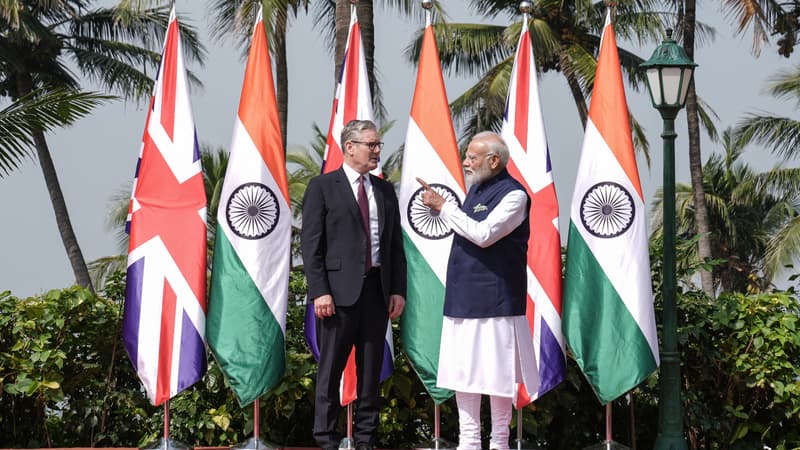“Big Brother is watching you…soon.” British Prime Minister Keir Starmer arrived at dawn on Wednesday in Bombay, India’s second city, accompanied by a delegation of important British bosses. On the agenda of this visit: the production of Bollywood feature films, a social assistance program supported by the prestigious Football Premier League, increasingly popular in India with an average of 71 million viewers, as well as commercial contracts and, above all… the Indian digital identification system.
During his visit to Mumbai, Keir Starmer inquired about the Aadhaar system, India’s digital identification program, which he calls a “resounding success.” It met with Nandan Nilekani, one of its architects, to assess the relevance of a similar system in the UK, usable for procedures such as school registration and permits.
Fingerprints, facial recognition and iris
The British Prime Minister highlighted the advantages of the Indian model “to modernize”, in particular the management of social benefits, but acknowledged criticism over the exclusion of certain minorities and security risks. The Indian digital ID currently affects almost all of the country’s 1.4 billion people and processes up to 80 million transactions a day.
Specifically, Aadhaar is a giant biometric system in India, which assigns a unique 12-digit number, linked to fingerprints, identification photographs and irises. It is essential for access to numerous public and private services, “facilitating the rapid authentication of citizens,” according to the authorities.
However, its detractors denounce insufficient protection of personal data, as well as the exclusion of a part of the population, particularly the poorest, who are denied medical care or social assistance due to lack of identity documents.
Telephone operators and banks have also threatened to close accounts that are not linked to an Aadhaar number, although the Indian Supreme Court, for its part, has stated that this should not be mandatory for private services or education. Activists have also denounced its use to disenfranchise certain Muslim voters in the north of the country.
Reviews in the UK
Keir Starmer, a supporter of a similar system across the English Channel, explained during his trip to Mumbai that the digital ID card on smartphones was necessary to “remedy the fact that too many people can come to work illegally” in Britain. He said that the presentation of this card will be mandatory for immigrants to demonstrate their right to work, and that the Government will also encourage other people to use it because “it would be a good passport.”
Speaking to reporters, the tenant of number 10 Downing Street lamented the complicated administrative procedures: “I don’t know how many times you have had to look for three bills in the bottom drawer to enroll your children in school, or apply for this or that.” He believes “we could benefit a lot from this.”
He also recalled that India “has already implemented an identification system and it has been a great success,” adding that “one of the meetings I will attend will focus on identification.”
But the Prime Minister’s justifications do not appear to have resonated with British public opinion. The digital ID card project is currently causing heated debate in the UK, mainly over privacy concerns.
Civil liberties groups are already concerned about storing personal data in a government app, fearing increased surveillance and “a risk of authoritarian drift.” A petition against this project has gathered more than 2.8 million signatures, demonstrating strong social and political opposition.
Furthermore, some fear that this system will exacerbate the difficulties of marginalized groups, particularly undocumented immigrants, by increasing their social exclusion and precariousness. Political voices, even within the conservative opposition, denounce an ineffective measure against illegal immigration and a “cynical strategy” to strengthen state control.
Source: BFM TV


